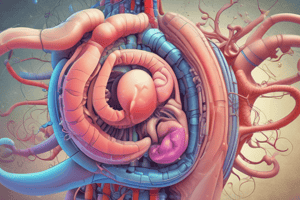Podcast
Questions and Answers
Which enzyme is responsible for breaking down carbohydrates in the digestive system?
Which enzyme is responsible for breaking down carbohydrates in the digestive system?
- Trypsin
- Pancreatic lipase
- Salivary amylase (correct)
- Gastric protease
What is the primary function of ghrelin in the body?
What is the primary function of ghrelin in the body?
- Stimulate ghrelin receptors in the hypothalamus (correct)
- Promote satiety
- Increase insulin production
- Inhibit hunger
Which of the following movements is responsible for moving food through the esophagus and stomach?
Which of the following movements is responsible for moving food through the esophagus and stomach?
- Peristalsis (correct)
- Retrograde movement
- Segmentation
- Circular waves
In the process of digestion, which enzyme breaks down fats into triglycerides and monoglycerides?
In the process of digestion, which enzyme breaks down fats into triglycerides and monoglycerides?
What is the main function of trypsin in the digestive system?
What is the main function of trypsin in the digestive system?
Which component of the gastrointestinal system is responsible for breaking down proteins and killing bacteria?
Which component of the gastrointestinal system is responsible for breaking down proteins and killing bacteria?
Which process involves the absorption of amino acids, glucose, and vitamins actively?
Which process involves the absorption of amino acids, glucose, and vitamins actively?
Which component of the gastrointestinal system involves the coordination of various hormones, nerves, and enzymes to control digestion?
Which component of the gastrointestinal system involves the coordination of various hormones, nerves, and enzymes to control digestion?
Which type of molecules are absorbed passively in the gastrointestinal system?
Which type of molecules are absorbed passively in the gastrointestinal system?
Which component of the gastrointestinal system involves the release of histamine in response to food in the stomach?
Which component of the gastrointestinal system involves the release of histamine in response to food in the stomach?
Flashcards are hidden until you start studying
Study Notes
Gastrointestinal Physiology
The gastrointestinal system, also known as the digestive system, is responsible for breaking down food into nutrients that can be absorbed and transported throughout the body. This process involves several key components, including gastric secretion, intestinal absorption, neurohumoral regulation, digestive enzymes, and motility.
Gastric Secretion
Gastric secretion begins with the release of hydrochloric acid from parietal cells, which helps to break down proteins and kill bacteria. Hydrogen ions are secreted by these cells into the stomach lumen, lowering its pH level and activating digestive enzymes such as pepsin, thereby facilitating protein breakdown.
Intestinal Absorption
Intestinal absorption occurs through both active and passive processes. Nutrients, electrolytes, and water are absorbed through the lining of the small intestine, while bacterial fermentation products like short-chain fatty acids are absorbed by colonocytes in the large intestine. Amino acids, glucose, and vitamins are absorbed actively, while water-soluble molecules like sodium bicarbonate and chloride ions are absorbed passively.
Neurohumoral Regulation
Neurohumoral regulation involves the coordination of various hormones, nerves, and enzymes to control different aspects of digestion. For instance, stimuli such as the presence of food in the stomach can trigger the release of histamine, which encourages gastric secretion. Additionally, the hormone ghrelin signals hunger by stimulating ghrelin receptors in the hypothalamus.
Digestive Enzymes
Digestive enzymes play a crucial role in breaking down complex macromolecules into smaller units that can be absorbed. Pancreatic amylase breaks down carbohydrates, lipases split fats into triglycerides and monoglycerides, and trypsin cleaves peptide bonds to produce individual amino acids. These enzymes work synergistically with other systemic factors to facilitate effective digestion.
Motility
Motility refers to the coordinated movement of food through the gastrointestinal tract. Peristalsis moves food through the esophagus and stomach via rhythmic contractions, ensuring efficient mixing and grinding of ingested materials. Additionally, specialized movements like segmentation, retrograde movement, and circular waves help propel food through the small intestine, where most absorption takes place.
In summary, gastrointestinal physiology is a highly regulated process involving multiple systems working together. Understanding these processes can help inform treatments for various disorders affecting the gastrointestinal system, such as malabsorption syndromes, inflammations, and mechanical obstructions.
Studying That Suits You
Use AI to generate personalized quizzes and flashcards to suit your learning preferences.




